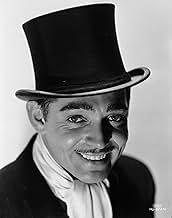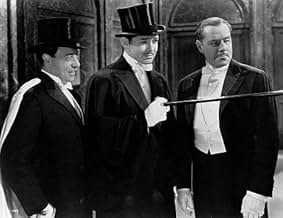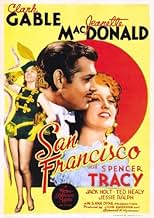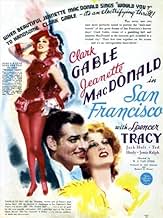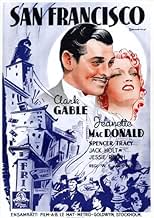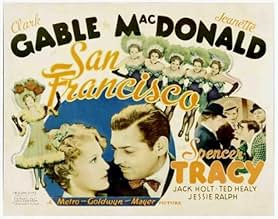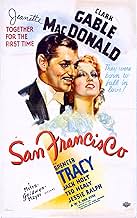IMDb रेटिंग
7.1/10
6.5 हज़ार
आपकी रेटिंग
अपनी भाषा में प्लॉट जोड़ेंA Barbary Coast saloonkeeper and a Nob Hill impresario are rivals for the affections of a beautiful singer, both personally and professionally, in 1906 San Francisco.A Barbary Coast saloonkeeper and a Nob Hill impresario are rivals for the affections of a beautiful singer, both personally and professionally, in 1906 San Francisco.A Barbary Coast saloonkeeper and a Nob Hill impresario are rivals for the affections of a beautiful singer, both personally and professionally, in 1906 San Francisco.
- निर्देशक
- लेखक
- स्टार
- 1 ऑस्कर जीते
- 5 जीत और कुल 6 नामांकन
Charles Judels
- Tony
- (as Charles Judells)
Warren Hymer
- Hazeltine
- (as Warren B. Hymer)
फ़ीचर्ड समीक्षाएं
You can't go wrong with the pairing of two of the great stars of Hollywood, Gable and Tracy......and the great star of the west coast, San Francisco. The role of Blackie Norton may be one of Gable's best, so cynical,so devil-may-care and just a little bit dangerous. Tracy play the understanding priest with his usual aplomb. As he told someone once "Don't ever let them catch you acting".
Gable's attraction to Jeanette McDonald is a little bit unbelievable. She really did belong with Jack Holt in this film......or better yet Nelson Eddy should have showed up at the last minute and swept her away with a song. Gable and McDonald don't mesh at all and there was not much chemistry between them although I must admit she is lovely. Be that as it may, the film is one of the best of Hollywood's mid-30's offerings. There is something for everyone; music, drama, comedy and the finale of the earthquake which is what we are waiting for. And what a spectacle it is!! It is very well done in those days before sophisticated special effects; with tumbling buildings, crashing walls and the inevitable fire. There are a couple of poignant scenes when the firefighters must blow up buildings and homes to control the fire thus destroying lifetimes of work and memories.
The ending is a little bit over the top as those who have lost their families and all that they own, joyously sing the Battle Hymn of the Republic and march up the hill to view the destruction (I'm not sure I would be that upbeat)......but it is still effective. The fade to the modern day (1936) San Francisco is just the right ending note. I highly recommend this film, not only for the Gable/Tracy pairing but also for the general excellence of the production.
Gable's attraction to Jeanette McDonald is a little bit unbelievable. She really did belong with Jack Holt in this film......or better yet Nelson Eddy should have showed up at the last minute and swept her away with a song. Gable and McDonald don't mesh at all and there was not much chemistry between them although I must admit she is lovely. Be that as it may, the film is one of the best of Hollywood's mid-30's offerings. There is something for everyone; music, drama, comedy and the finale of the earthquake which is what we are waiting for. And what a spectacle it is!! It is very well done in those days before sophisticated special effects; with tumbling buildings, crashing walls and the inevitable fire. There are a couple of poignant scenes when the firefighters must blow up buildings and homes to control the fire thus destroying lifetimes of work and memories.
The ending is a little bit over the top as those who have lost their families and all that they own, joyously sing the Battle Hymn of the Republic and march up the hill to view the destruction (I'm not sure I would be that upbeat)......but it is still effective. The fade to the modern day (1936) San Francisco is just the right ending note. I highly recommend this film, not only for the Gable/Tracy pairing but also for the general excellence of the production.
San Francisco, like so many other films from this era, just reminds me again how movies today have lost the art of the build-up. They just hit you over the head with mind-numbing action from frame one. Hollywood(and audiences of today) would do well to watch classics like "San Francisco", where story takes precedence over special effects and when the effects do come, they are in service to the story. And they mean so much more and have so much more impact when held back until the last possible moment. Why can't we allow ourselves to be immersed in the story? Or are we just too impatient for it now?
MGM's blockbuster was conceived originally as a vehicle for Jeanette MacDonald to co-star with some non-singing players while her normal screen partner Nelson Eddy was on a concert tour. Mr. Eddy always considered his screen roles secondary to his concert singing which was the reverse of how Jeanette felt.
According to a recent book about both Eddy and MacDonald, Clark Gable had been gotten out of romantic dalliance with some hush money MGM paid some woman off with. He didn't really want to do the film, but Louis B. Mayer kind of hammerlocked him into it. MacDonald however chose Spencer Tracy for the part of Father Tim Mullin, Gable's best friend and conscience of the movie.
Nevertheless the part of Blackie Norton, impresario of the Barbary Coast in 1906 San Francisco fits Gable perfectly. The man takes his pleasures where he finds them, but has a concern for the folks in his area who are getting the raw end of things from the upper crust on Nob Hill as personified by Gable's rival Jack Holt.
Gable and Holt are rivals for Jeanette MacDonald as well. She's fresh from the country, a parson's daughter with a great set of soprano pipes. Both like what they see, but Holt appreciates her voice quite a bit more than Gable at first.
Besides Ms. MacDonald, Gable and Holt have their differences over some of the rottenly constructed houses on the Barbary Coast and Gable wants a lot of new construction there. Of course the Earthquake of April 18, 1906 settles the whole issue of urban renewal.
If the special effects Oscar was around at that time, San Francisco would have won it for sure. Even over 60 years after the film came out and with the more modern techniques of special effects available, the sight of the earthquake is still visually stunning.
Gable and MacDonald did not get along on the set, Gable was more used to down to earth leading ladies like Crawford and Harlow. MacDonald and Tracy got along just fine. Her intercession with Louis B. Mayer changed the course of Tracy's career forever. Previous to San Francisco, Tracy played a whole slew of roughneck heroes in B films at Fox and his first few at MGM were in the same mold. As Father Tim Mullin, Tracy became the wise father figure (no pun intended) that the public came to know so well. He received his first Academy Award nomination for this part.
Jeanette has some operatic selections and three hymns to sing during the film, The Holy City, Battle Hymn of the Republic, and Nearer My God to Thee. She also got two original songs, Would You and the title tune of the film.
The song San Francisco was adopted by the city fathers of San Francisco as the city's official song. That is until Tony Bennett lost his heart there. Controversy still rages on the bay as to which should be the official song of San Francisco.
San Francisco made a whole lot of money for Leo the Lion that year. It in fact inspired Darryl F. Zanuck to burn down Chicago the following year so he could get in on that disaster epic box office.
San Francisco still holds up well today, the action, the music, and Spencer Tracy's groundbreaking performance. Something for everyone.
According to a recent book about both Eddy and MacDonald, Clark Gable had been gotten out of romantic dalliance with some hush money MGM paid some woman off with. He didn't really want to do the film, but Louis B. Mayer kind of hammerlocked him into it. MacDonald however chose Spencer Tracy for the part of Father Tim Mullin, Gable's best friend and conscience of the movie.
Nevertheless the part of Blackie Norton, impresario of the Barbary Coast in 1906 San Francisco fits Gable perfectly. The man takes his pleasures where he finds them, but has a concern for the folks in his area who are getting the raw end of things from the upper crust on Nob Hill as personified by Gable's rival Jack Holt.
Gable and Holt are rivals for Jeanette MacDonald as well. She's fresh from the country, a parson's daughter with a great set of soprano pipes. Both like what they see, but Holt appreciates her voice quite a bit more than Gable at first.
Besides Ms. MacDonald, Gable and Holt have their differences over some of the rottenly constructed houses on the Barbary Coast and Gable wants a lot of new construction there. Of course the Earthquake of April 18, 1906 settles the whole issue of urban renewal.
If the special effects Oscar was around at that time, San Francisco would have won it for sure. Even over 60 years after the film came out and with the more modern techniques of special effects available, the sight of the earthquake is still visually stunning.
Gable and MacDonald did not get along on the set, Gable was more used to down to earth leading ladies like Crawford and Harlow. MacDonald and Tracy got along just fine. Her intercession with Louis B. Mayer changed the course of Tracy's career forever. Previous to San Francisco, Tracy played a whole slew of roughneck heroes in B films at Fox and his first few at MGM were in the same mold. As Father Tim Mullin, Tracy became the wise father figure (no pun intended) that the public came to know so well. He received his first Academy Award nomination for this part.
Jeanette has some operatic selections and three hymns to sing during the film, The Holy City, Battle Hymn of the Republic, and Nearer My God to Thee. She also got two original songs, Would You and the title tune of the film.
The song San Francisco was adopted by the city fathers of San Francisco as the city's official song. That is until Tony Bennett lost his heart there. Controversy still rages on the bay as to which should be the official song of San Francisco.
San Francisco made a whole lot of money for Leo the Lion that year. It in fact inspired Darryl F. Zanuck to burn down Chicago the following year so he could get in on that disaster epic box office.
San Francisco still holds up well today, the action, the music, and Spencer Tracy's groundbreaking performance. Something for everyone.
This is a great old film. I have seen it several times, and enjoy it every time. I think Jeanette MacDonald is beautiful, and what a voice! I love to hear her sing.
My mother gave me my middle name of Jeanette after her. It is interesting that a film with so much "fancy" singing
could have been so popular. The general public must have had more class then than now.
It is good to see the "oldies." Many of them are better than today's films.
I certainly like this one.
My mother gave me my middle name of Jeanette after her. It is interesting that a film with so much "fancy" singing
could have been so popular. The general public must have had more class then than now.
It is good to see the "oldies." Many of them are better than today's films.
I certainly like this one.
I have just watched the colorized version of this knock-out film. Whether in color or B &W, it is a powerfully entertaining film. When Blackie Norton finds religion and Mary Blake spots him, humbled and on his redemption encrusted knees,tears well up in my jaded eyes. Everything works so wonderfully in this film. Still, as destructive and tragic as the earthquake scenes are,this movie is basically a love story and what male would not swoon over the voice and the innocence of Mary Blake. Certainly not me.
क्या आपको पता है
- ट्रिवियाClark Gable did not want to make this film but he was at the mercy of MGM studio head Louis B. Mayer, who had just paid off one of his numerous paramours.
- गूफ़As Blackie walks away from a building being blown up (actually a process shot), Clark Gable's head becomes momentarily transparent.
- भाव
Jack Burley: [referring to Mary Blake] Well, there's no law against an opera singer being slender, young and beautiful.
- क्रेज़ी क्रेडिटPrologue: "San Francisco--guardian of the Golden Gate--stands today a Queen among seaports--industrious, mature, respectable. But perhaps she dreams of the Queen and city she was--splendid and sensuous, vulgar, and magnificent--that perished suddenly with a cry still heard in the hearts of those who knew her, at exactly 5:15 a.m. April 18, 1906."
- इसके अलावा अन्य वर्जनAfter initial premiere, the manager of the Paramount Theater in San Francisco added to the downbeat ending a few shots showing the Golden Gate Bridge being built. Seeing the positive public reaction, MGM decided to have the sequence added to all other prints in release.
- कनेक्शनEdited into What Price Safety! (1938)
- साउंडट्रैकSan Francisco
(1936)
Music by Bronislau Kaper and Walter Jurmann
Lyrics by Gus Kahn
Played during the opening credits and often in the score
Sung by Jeanette MacDonald (uncredited)
Reprised by her and others at a political rally and at the end
टॉप पसंद
रेटिंग देने के लिए साइन-इन करें और वैयक्तिकृत सुझावों के लिए वॉचलिस्ट करें
- How long is San Francisco?Alexa द्वारा संचालित
विवरण
बॉक्स ऑफ़िस
- बजट
- $13,00,000(अनुमानित)
- चलने की अवधि
- 1 घं 55 मि(115 min)
- रंग
- पक्ष अनुपात
- 1.37 : 1
इस पेज में योगदान दें
किसी बदलाव का सुझाव दें या अनुपलब्ध कॉन्टेंट जोड़ें


